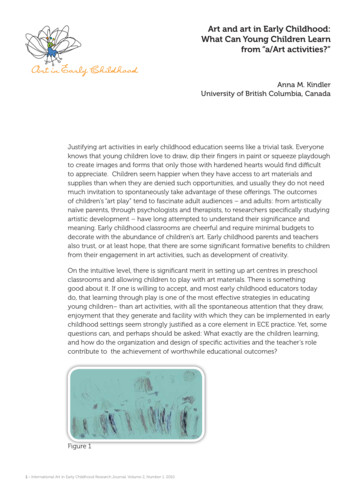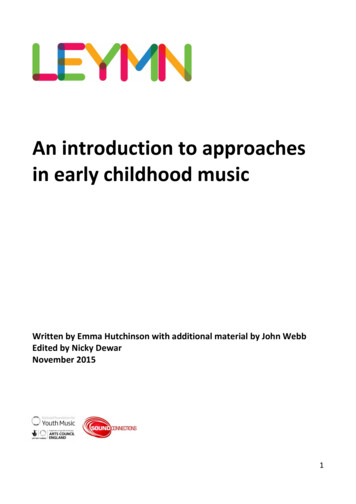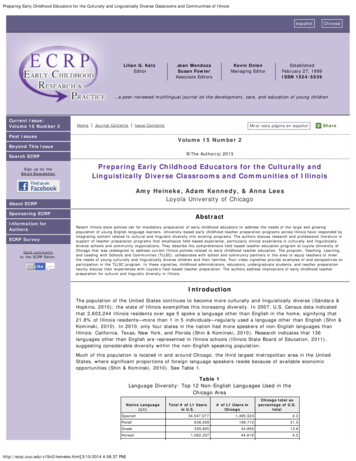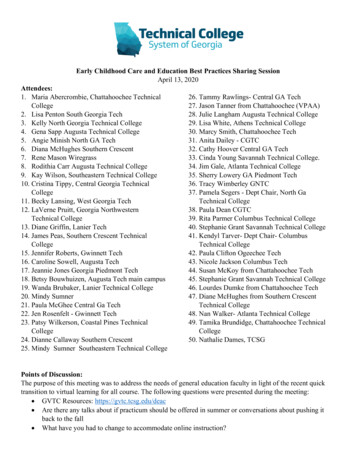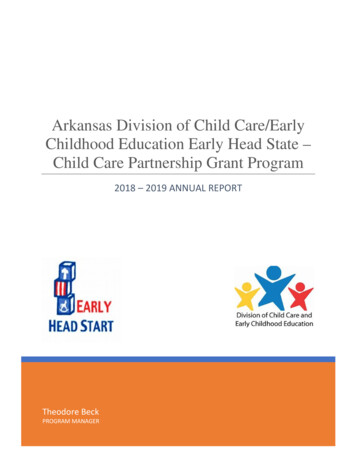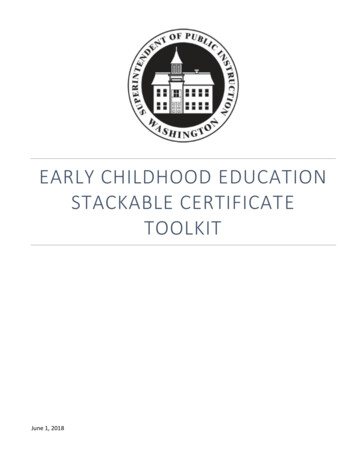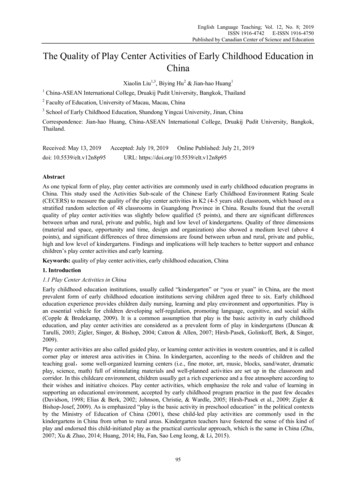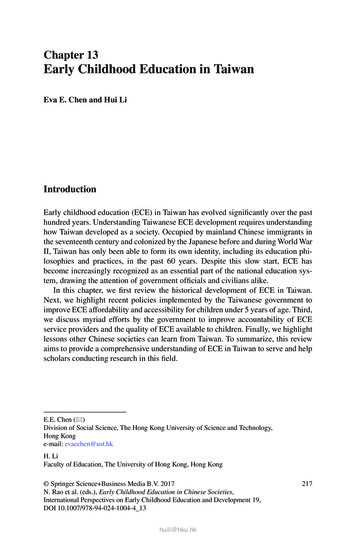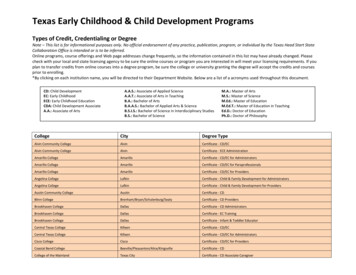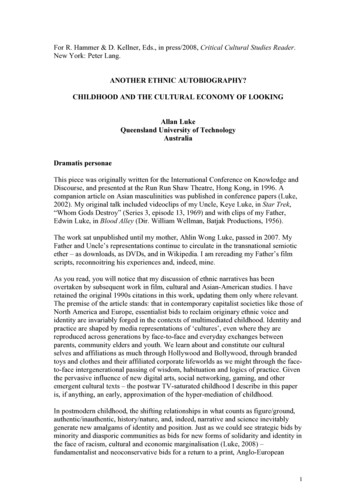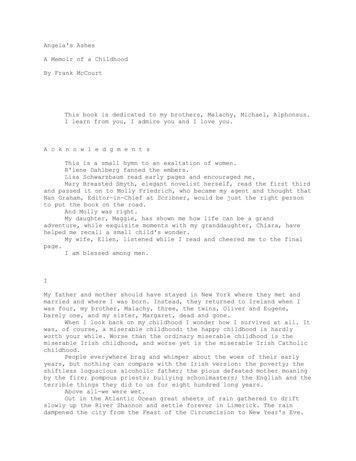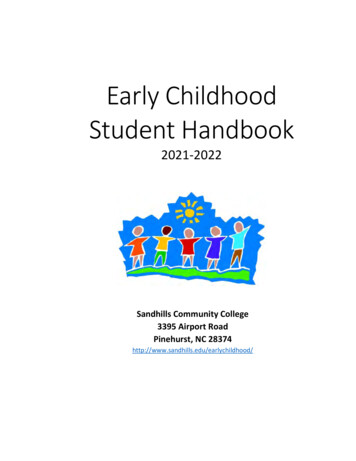
Transcription
Early ChildhoodStudent Handbook2021-2022Sandhills Community College3395 Airport RoadPinehurst, NC 28374http://www.sandhills.edu/earlychildhood/
ContentsBrief History of the SCC Early Childhood Associate Degree ProgramSandhills Community College Mission StatementSCC Early Childhood Program Mission StatementEarly Childhood Conceptual Framework (Visual)Early Childhood Program DescriptionEarly Childhood Associate Degree Program GoalsKey Program DocumentsSpecial Program RequirementsProgram EffectivenessAdvising StudentsWhat Makes a Successful Online Learner?The 7 Habits of Highly Effective College StudentsCampus ResourcesEarly Childhood/Public Services Department ClubImportant Contacts
Brief History of the SCC Early Childhood Associate Degree ProgramThe Sandhills Community College (SCC) Early Childhood program was launched under theleadership of Elizabeth (Betty) High Rounds who directed the program for close to thirtyyears. Betty died a month before her sixtieth birthday; well before she was ready to retirefrom the early childhood field.1942-2002Betty was an energetic, passionate, creative individual who dedicated her life to be anadvocate for young children and their families. It is because of her dedication and leadershipthat Sandhills Community College named the early childhood classroom, the Betty HighRounds Learning Laboratory and dedicated several bronze statues in her honor. The statuesappropriately are of children reading. Betty’s great love was children’s literature, and thelove of her life, Glen Rounds, was an accomplished author and illustrator of children’s books.Dedicated June 2003Ronda Hawkins, longtime friend, colleague and mentee of Betty Rounds, assumed the roleof Program Coordinator for the SCC Early Childhood program in 2002. Ronda continued touphold the mission and values that Betty Rounds had implemented for the program andwent on to share her own passions with the program: love of play and outdoor learning.Ronda, who was equally passionate about and dedicated to the field of Early Childhood,worked diligently to share not only with students in the program but with all early childhoodeducators in the community, state, nation and beyond about the value and benefits ofOutdoor Learning Environments (OLE) for children.
Through her collaboration with others in the field she was able to bring to fruition her visionof a Play Mobile that now travels around the state allowing many to promote loose parts,outdoor learning and play with children of all ages. Her dream is to someday have anoutdoor model classroom/environment in the Sandhills Community College mmunity/play-initiatives/playmobile/In May 2006, Ronda Hawkins, with the help of Peggy Johnson, SCC Early Childhood Professorand colleague, led the nation in working to have the SCC Early Childhood Associate degreeprogram became one of the first five community colleges in the United States to receivenational accreditation from the National Association for the Education of Young Children(NAEYC). In 2013 the program was reaccredited. The stellar reputation of the SCC EarlyChildhood program today is a direct result of the passion, commitment and vision ofProgram Coordinator, Ronda Hawkins. Ronda stepped down from her position in 2016 andSusan Wright assumed the role of SCC Early Childhood Program Coordinator. Rondacontinues to teach at SCC and is an integral part of the Early Childhood Program but shenow has a bit more time for pursuing her personal and professional passions!Sandhills Community College Mission StatementThe mission of Sandhills Community College is to provide educational programs of thehighest quality to all the people of Sandhills.What We Believe The college is committed to the five core values of INTEGRITY, HELPFULNESS, EXCELLENCE,RESPECT, and OPPORTUNITY. These values guide and direct Sandhills Community College as itseeks: To welcome students of all ability levels and to provide programs that prepare themfor employment or for transfer (EXCELLENCE); To develop student and academic support services that promote student success(HELPFULNESS);
To provide training for local businesses and to enhance the economic well-being ofthe region (OPPORTUNITY);To contribute to the cultural and artistic richness of the community and to theeducational needs of our retired population (INTEGRITY);To create a campus environment that celebrates its faculty and staff and supportstheir personal and professional development (RESPECT).SCC Early Childhood Program Mission StatementIt is the mission of Sandhills Community College’s Early Childhood program to provideeducational opportunities of the highest quality to early childhood students of theSandhills area of central North Carolina.One of the most important components of providing high-quality early childhoodeducation and services for young children and their families is planning for the educationand preparation of teachers and providers. Research has determined that the mostimportant determinant of the quality of children’s experiences is the adults who areresponsible for children’s care and education. At Sandhills Community College, we take ourethical responsibility to provide the highest quality program to our early childhoodstudents very seriously. We provide students with both theoretical knowledge andpractical experience while always encouraging reflection, self-evaluation and acommitment to lifelong learning. We are committed to raising the quality of childcare inour community, degree by degree and see ourselves as agents of positive change.In addition to SCC’s five core values of integrity, helpfulness, excellence, respect andopportunity, our conceptual framework is developed around the values and theories inwhich Betty High Rounds and Ronda Hawkins so strongly believed. We continue to infusethese values and theories throughout our program today and use them to guide ourdecision-making process.1. Put children first – always.2. Implement a holistic approach to teaching and learning.3. Remove barriers to learning.4. Inspire a love of reading.5. Encourage self-reflection.6. Collaborate with others and trust in the abilities of the group.
7. Promote creativity.8. Grow role models, mentors, leaders and advocates.9. Be goal driven and celebrate success.10. Embrace life-long learning.11. Be engaged and have fun.12. Foster respectful relationships.Our program is grounded in NAEYC’s standards, developmentally appropriate practice(DAP) and a playful and practical approach to teaching and learning. Students learnmultiple theories of child development and how these theories are reflected indevelopmentally appropriate practice. We have a strong emphasis on the value andbenefits of nature and outdoor learning as well as the power of play.We teach our students utilizing the North Carolina Foundations for Early Learning andDevelopment (NCFELD) guide, the North Carolina Division of Child Development and EarlyEducation (DCDEE) rules and regulations, current NC initiatives and a variety of researchbased organizations focused on early care and education. Our students engage and learnthrough practical hands- on experiences, fieldtrips, observations at local childcare centersand community guest speakers. They learn to implement curricula based on youngchildren’s interests and developmental needs.Students begin to learn about NAEYC’s associate degree standards in EDU 119:Introduction to Early Childhood Education as they begin work on their early childhoodprofessional portfolio which is centered on the NAEYC standards. They synthesize theirunderstanding in EDU 284: Capstone Practicum when they complete their professionalportfolio and engage in a mock -statements/professional-standardscompetenciesUpon graduation, SCC early childhood associate degree students will be proficient in theNAEYC standards, NCFELD, DAP, Play-Based learning and OLE. SCC students will havedeveloped an understanding about the importance of respectful relationships with youngchildren. They will have a “toolkit” to take with them to help teach necessarysocial/emotional skills to all children and families. SCC students will have a strongunderstanding of the benefits of early literacy and the power of reading aloud to youngchildren. And lastly, our students will know how to advocate, at all levels, in a respectfuland professional manner in order to stand up for what is right in the field of EarlyChildhood Education.
Early Childhood Conceptual Framework (Visual)
Early Childhood Program DescriptionThe Early Childhood Education curriculum prepares individuals to work with children frombirth through age eight in diverse learning environments. Students learn to foster thedevelopment of young children in each of the following domains: Approaches to Play andLearning, Emotional/Social, Health/Physical, Language/Communication and Cognitive.Graduates are prepared to plan and implement developmentally appropriate programs inearly childhood settings. Employment opportunities include child/family organizations,childcare programs, preschools, public and private schools, recreational centers, HeadStart Programs, and school-age programs.The SCC Early Childhood program offers the following three Associate Degree pathways:Early Childhood Associate Degree (A55200), Early Childhood Associate Birth- KindergartenLicensure Transfer Degree (A55220L), and Early Education Non- Teaching Licensure TransferDegree (A55220NL). In addition, the program offers the following two certificates:Infant/Toddler Certificate (C55220IT) and Preschool Certificate (C55220P) We offer earlychildhood classes online, at our main Pinehurst campus and at the Hoke SandhillsCommunity College Center. We also offer a High School certificate. Students who wish totransfer to a 4-year school and pursue a bachelor’s degree in Birth to Kindergarten in orderto teach Kindergarten and below should pursue our A55220L degree. Students who wish totransfer to a 4-year school and pursue a bachelor’s degree in Early Care and Education inorder to work for organizations that support children and families, but NOT teach, shouldpursue our A55220NL degree. Students who wish to work in childcare but do not plan totransfer to a 4-year school should pursue our A55220E degree. All students should thinkabout adding on a certificate which they can earn along the way to their Associate Degreeand the certificate will show that they are highly qualified in one area of childcare. Weencourage our students to pursue employment in the field of Early Childhood while they arecompleting their classes at SCC.In North Carolina, lead teachers in a childcare center must meet only two requirements:they must be 18 years of age and have completed one college level 4 credit course: EDU119 – Introduction to Early Childhood Education with a grade of a C or higher.We feel that it is important to offer certificates to encourage our students, as well asexisting childcare providers without formal education, to pursue professional developmentin a nonthreatening, non-overwhelming way. Our hope is that once they begin theireducational process, they will view their certificate as a steppingstone to one of the EarlyChildhood Associate degrees. The certificate programs support providers in their efforts toprovide quality childcare.Please find our current Course Requirements on the Sandhills Community College’s EarlyChildhood web page: http://www.sandhills.edu/earlychildhood/
Early Childhood Associate Degree Program GoalsProgram Mission and Competencies are achieved by the accomplishment of our goals to:1. Educate and prepare students for careers in the field of early childhood and to assistthem in securing employment in those fields;2. Prepare students to transfer to baccalaureate institutions specializing in earlychildhood;3. Provide challenging learning opportunities, including work and service-learningexperiences, that prepare students to work with young children and their families indiverse settings;4. Value and use student feedback to improve courses and meet students needs.5. Monitor program and service performance in each of the above areas and to use thedata gathered to improve the program's effectiveness.Key Program DocumentsNC Foundations for Early Learning and Development:http://ncchildcare.nc.gov/pdf forms/NC foundations.pdfNAEYC Code of Ethical Conduct and Statement ofCommitment: Revised April 2005, Reaffirmed and Updated May 2011http://www.naeyc.org/files/naeyc/image/public policy/Ethics%20Position%20Statement2011 09202013 update.pdfNAEYC Code of Ethical Conduct Supplement for Early Childhood ProgramAdministrators Adopted July 2006, Reaffirmedand Updated May 2011http://www.naeyc.org/files/naeyc/image/public policy/Supplement%20PS2011 09202013update.pdfNAEYC Code of Ethical Conduct Supplement for Early Childhood Adult Educators AdoptedSpring 2004http://www.naeyc.org/files/naeyc/image/public policy/Supplement%20PS2011 09202013update.pdf
Special Program Requirements NC law prohibits anyone convicted of a felony from working with children. Associate Degree Students are required to work a minimum of 144 hours in EDU284 over the course of a semester in an assigned quality early childhoodenvironment working directly with young children. The student is responsible fortransportation to off-campus Practicum sites and for complying with all off-siteregulations. NC Division of Child Development and Early Education requires that everyoneworking directly with children have a TB test done prior to their first day workingwith children. Practicum sites may also require a criminal background check anddrug testing to be done prior to the first day of work/class.https://ncchildcarecbc.nc.gov/Program EffectivenessProgram effectiveness of the Early Childhood Education curriculum at Sandhills CommunityCollege is measured and monitored by the Department of Public Services, the Early ChildhoodProgram Coordinator, and the Office of Planning and Research. The Early Childhood (EC)program establishes and measures its own outcomes in accordance with its purpose andmission as well as the mission of the college. Outcomes are measured and updated annually bythe Program Coordinator in conjunction with the Office of Planning and Research.Current students, graduates, practicum supervisors, employers, and non-completers of theprogram are evaluated annually. At the end of each course, students evaluate the instructor.This is done anonymously and is sent to the Dean of Instruction who reviews the results prior tosharing this information with the Department Chair and Instructors. Feedback is taken seriouslyand used to improve our teaching and better meet the needs of our students.*Students are encouraged to fill out surveys and instructor evaluations every time they areoffered. Student feedback is critical to program improvement.Advising StudentsEach student is assigned an advisor. Students meet with advisors, virtually or face to face, priorto registering for classes each semester and at any other point in time when they feel the needto discuss their career goals, progress, or any other pertinent issue. It is the student’sresponsibility to schedule time with their advisor. Students are also able to register themselvesusing Self-Serve found in the SCC Student Portal. *We highly encourage students to meet withtheir advisor each semester prior to registering for classes. When students are ready tograduate, it is the responsibility of the student to apply online by the SCC deadline.
What Makes a Successful Online Learner?Source: Minnesota Online High School and Minnesota Department of EducationTwo key advantages of online learning are flexibility and convenience. But online learning is a lotmore challenging than it may seem. Are you considering taking some or all of your coursesonline? Good for you! But first, make sure you're ready to succeed. Online learning can sound sowonderful that some students start with an unrealistic vision. In reality, online courses requirejust as much, if not more, time and energy as traditional classroom courses. It also requiresspecific computer skills and learning strategies in order to succeed. To see if you're ready, seehow many items of the following skills you have:1. PersistencePersistence is perhaps the biggest key to success in online learning. Students who succeedare those who are willing to tolerate technical problems, seek help when needed, work dailyon every class, and persist through challenges. When you run into a challenge, keep trying and ask for help.Set up a manageable study schedule for yourself and stick to it. Students who succeedare those who log in and make progress every day. This is especially important after thenovelty of going to school online starts to wear off!2. Effective Time-Management SkillsYou must be able to manage your time well. Most courses are not taught in real time. Thereare no set times for classes. This flexibility is one of the great benefits of online learning. Itcan also be a drawback for a student who procrastinates, is unable to stick to a routinestudy schedule, or is not able to complete assignments without daily reminders from ateacher.Effective time-management skills don't just happen. They have to be learned. Once you do,they will benefit you throughout your life. Follow the tips below to develop yours: Review the syllabus for each of your courses. Develop a long-term plan for completingyour major assignments.Make a daily "To Do" list. Have fun checking things off the list as you complete them.It takes time to develop good habits, but you'll gain satisfaction from being well-organizedand accomplishing your tasks.
3. Effective and Appropriate Communication SkillsCommunication skills are vital in online learning because students must seek help when theyneed it. Teachers are willing to help students, but they are unable to pick up on nonverbalcues, such as a look of confusion on a student's face. Follow these tips:Use the tools provided by the school to communicate with your teachers. Many onlineschools and programs provide several ways for students and/or parents to communicatewith teachers and staff. These might include e-mail, discussion groups, chat room officehours, cell phones, and even text messaging. Teachers and staff want to help you to succeedin your classes and will answer your questions. It may feel awkward to talk with yourteachers this way, but don't worry. If your teacher has chat room or cell phone office hours,don't be shy about using those tools to communicate with your teacher.Use appropriate style and language for school. When communicating with teachers andother staff, you should write in full, grammatically correct sentences and with a respectfultone. Many students are used to a very informal style of writing in chat rooms, blogs, textmessages, and so forth.Because of the distance, it's tempting for some students to say things out of anger orfrustration that they would never say to a teacher in person. Online teachers areprofessionals. Treat them with respect and courtesy.4. Basic Technical SkillsOnline learners need basic technical skills to succeed. These include the ability to createnew documents, use a word processing program, navigate the Internet, and downloadsoftware.Most online schools have new student orientation programs. These teach students how touse the school's learning management system and other online tools, but they typicallydon't cover the basics. If you lack basic computer skills, you may want to find an onlinetutorial such as the one available through The Library Network. You'll also want to check theonline school's main website for their hardware and software requirements. Make sure yourown computer meets those requirements.5. Reading and Writing SkillsReading and writing are the main ways you'll communicate in an online class. Althoughsome hard copies of textbooks might be required, you should be comfortable reading a lotof documents on a computer screen and able to type.
Some tests and quizzes have multiple choice questions, but many of your assignments willinvolve writing short or long answers. If you type less than 25-30 words per minute, it maybe worth completing a typing software program before beginning online classes.6. Motivation and IndependenceTo be successful, an online student has to want to succeed. Online learning requiresindependence, internal motivation, responsibility, and a certain level of maturity.Have you given some thought to your own personal reasons for attending school?Are you determined and self-motivated to succeed in school?There are many worthwhile reasons to work hard in school. You might want a greater levelof personal satisfaction with your future career. Or perhaps it's personal pride in youraccomplishments. Or maybe you are seeking a wider range of opportunities available to youwith higher education or a higher income.7. A Good Study EnvironmentAnother critical component of academic success is a good study environment. Get some peace and quiet. You will need a quiet place to work without distractionsfrom things like television, family, or roommates. Avoid games. Consider uninstalling any computer games to avoid temptation. Or keepthe games on a different computer in the house. Turn off your cell phone. Let friends and family members know the hours that you willbe "at" school. Beware surfing the black hole of the Internet. It is easy to lose track of the time as youwander from site to site. Consider ergonomics. Adjust the height of your chair, keyboard, and screen so that youare comfortable. Forearms and thighs should be level and parallel to the floor. Wristsshould not be bent while typing. Set up good lighting and comfortable seating. Lighting in the room should be at least asbright as the computer screen to avoid eye strain.The 7 Habits of Highly Effective College ucation/higher education/7habitscollege.htmlSelf-managementHabit 1: Be Proactive I am responsible for my education and life.Habit 2: Begin with the End in Mind I have a plan for what I want to accomplish.
Habit 3: Put First Things First I do the most important things first.Interpersonal skills and teamworkHabit 4: Think Win-Win I am considerate of others, but I also have the courage to stand upfor myself.Habit 5: Seek First to Understand, Then to Be Understood I hear people out beforeexpressing my own opinion.Habit 6: Synergize I value the strengths of other people and combine them with my ownto solve problems.WellnessHabit 7: Sharpen the Saw I regularly recharge my body, heart, mind, and spirit so I canstay sharp and improve myself.Campus ResourcesLearning Resource CenterThe Learning Resource Center is an open computer lab located within Boyd Library. The LRC isequipped with networked computers and printers. A variety of software is installed on eachcomputer. All provide Internet access. The Learning Resource Center is fully staffed. Staffmembers are trained and ready to answer any questions you may have.Tutoring CenterThe Tutoring Center provides one-on-one tutorial sessions or small group instruction for allstudents needing extra assistance in enrolled classes or in their preparation to enter a chosencurriculum. The intention of the Tutoring Center is to assist and encourage students in theireducational advancement. Tutoring is offered free of charge. The college now has a WritingLab, Math Lab and Speaking Lab for students to use as well, free of charge.Boyd LibraryThe Boyd Library has provided excellent support to the Early Childhood Program. They areresponsive to our requests for adding additional resources to the library collection.Representatives from the library have come to our classes to teach our students how to doeffective online searches using the databases as well as point them to the online tutorials andresources for class. They also provide tours of the library pointing out locations of importantearly childhood materials.
SCC Counseling Center and SCC Career CenterStudents can receive free and confidential personal counseling from our professionalcounselors on campus. Students can also seek career counseling at our Career Center.SCC Early Childhood ClubThe Early Childhood club is now a part of the Public Services Department Club.1.2.3.4.1.2.3.4.5.6.Why Join the Club?To network with other SCC early childhood students.To participate in professional development opportunities.To participate in service projects that will benefit children and families.To develop advocacy skills.Goals of the ClubDevelop a sustainable, active Club.Offer trainings that lead to certification such as SIDS and First Aid/CPR.Provide an information website that facilitates communication amongst our members.Fundraise to help offset cost of fieldtrips and trainings and to provide scholarships tostudents.Provide information to our local communities on what is considered best practiceresulting in quality of care and education looks.Conduct service projects that will benefit children in our local communities as well asour global community.Important ContactsSusan WrightProgram Coordinator, Professor, Early Childhood EducationEmail: wrightsu@sandhills.eduOffice: Van Dusen 217Phone: (910)246-5360Ronda HawkinsProfessor, Early Childhood EducationEmail: hawkinsr@sandhills.eduOffice: Van Dusen 229Phone: (910)695-3808
Aimie HooverAdjunct Professor, Early Childhood EducationEmail: hoovera@sandhills.eduTaylor McCaskillAdjunct Instructor, Early Childhood EducationEmail: mccaskillt@sandhills.eduMehera ArdingerAdjunct Instructor, Early Childhood EducationEmail: ardingerm@sandhills.eduNichole HollowayFaculty Secretary, Early ChildhoodEmail: hollowayn@sandhills.eduOffice: 222 Van Dusen HallPhone: (910)695-3963
pursue our A55220NL degree. Students who wish to work in childcare but do not plan to transfer to a 4-year school should pursue our A55220E degree. All students should think about adding on a certificate which they can earn along the way to their Associate Degree and the certificate will show that they are
